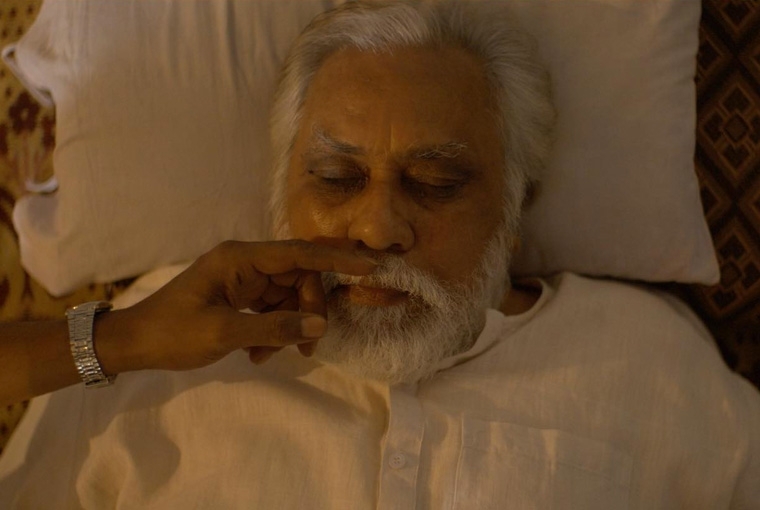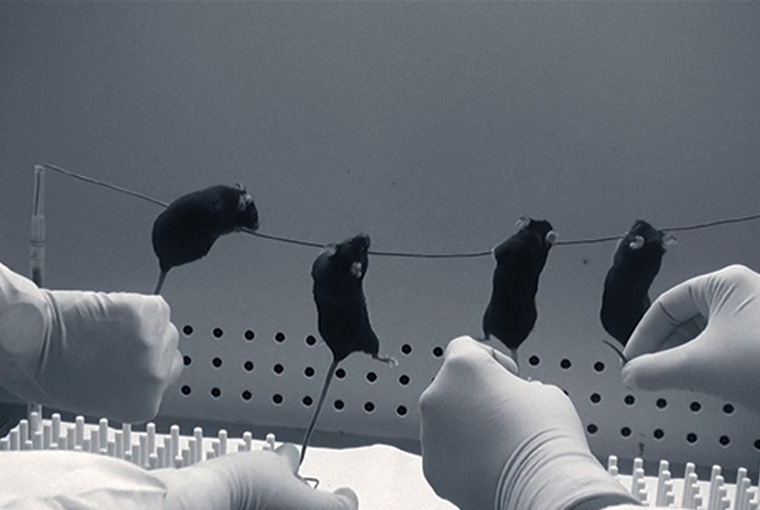

As the National Films Awards are announced, we celebrate six films that have been featured in Platform and left us impressed, right since they were in the works. Shubhashish Bhutiani’s poignant and intriguing film Mukti Bhawan tells the story of a father who asks his son to take him to Benaras to attain Moksha. Leeches traces the disturbing tale of one-day brides in Hyderabad. The Cinema Travellers takes you around India and informs you about the ancient tradition of showmen riding lorries, bringing the world of cinema to faraway villages. Neerja is the real-life story of a 23-year-old air hostess who saved the lives of passengers aboard the hijacked Pan Am Flight 73. And both Fireflies In The Abyss and Placebo explore haunting stories of social issues plaguing India today.
The directors behind the six nuanced films share their inspiration and take us through the journey that shaped these important films:
The Cinema Travellers
Shirley Abraham and Amit Madheshiya
'The Cinema Travellers was born out of a process of researching, travelling and eventually, arriving. When we set out to travel, we were not even looking to find travelling cinemas. We were just interested to see how people are watching films in our country. Bollywood alone produces more than a thousand films, and back then there was this whole thing of travelling theatres shutting down and people were lamenting the loss of this institution. There was this sense of nostalgia. So we just set out to see around the country. This was after college, around the time we were doing our own things; Amit was working as a photographer and I was in Bombay. We spent some time traveling and observing life around us; that’s how we came across the travellers.
We took this decision of making a film out of it because that would allow is to talk about the association that people have built with traveling cinema. This was a form of cinema that had been thriving for more than ten decades. You look at it, and it feels eternal. It takes you back in time. But of course, you understand that technology will eventually catch up, or it will have to catch up with technology. And we were living with the fact that such cinema still exists; that was something that had charm. But that’s not the story. If you watch the film, it is really a specific story of three people. And living with these people, knowing them, it hit me that this had to be a documentary. A photo project wouldn’t have don’t justice and not even a film, because there is no way this could have been scripted – we were not as smart.'
Special Jury Award for Non-Feature Films

Mukti Bhawan
Mukti Bhawan
Subhashish Bhutiani
'I went on a backpacking trip with a friend, and Benaras was our last stop. I had heard about the salvation hotels through a news article, so I was really curious to go and visit one. It’s a dark theme but really fascinating at the same time. I went there just as an inquisitive guy at first. I talked to the manager and saw this rule board behind him...gradually I started talking to the people there, seeing how days panned out. I talked to many guests, heard their stories—how long they’d been waiting to attain Moksha, as they put it. And I realised that this is a crazy concept adopted by human beings. It may be something unusual for you and me, but it is followed by people like us. The thought stayed with me for a long time and there was this particular story that stayed with me—about a son who had to bring his father there. I thought it was really powerful; a son taking his father to die...what it would mean for the son and the family. I wrote the script in freehand first…you’ll find little humour in it, some sadness, and a little gentleness somewhere. I realised that there is no genre to this movie. I just wanted to translate this feeling onto the screen.'
Special Mention: Adil Hussain and Shubhashish Bhutiani
Leeches
Payal Sethi
'I was in Hyderabad where I read a news piece on one-day brides in the city. I would spend a lot of time roaming around the Charminar area, the old city and we were looking for a place to print wedding cards and someone sent me to this shop in the same area. The multiple trips to the area got me thinking as to how many girls around have been a part of this or will be in the future. It just kind of changed everything for me. I kept wanting to look more and discover what's actually happening behind these veils.
I didn't want to represent anything or anyone in a way that was coming from a prejudice or coming from mind pressure of what is right or wrong. But rather present the facts as they are, and allow people to draw their own conclusions and have their own reactions to it, which is what I hope the film does. Ultimately it is a work of fiction, very much based on fact and reality but I'm trying to make people aware of that fact that something like this is happening, and also make people feel something on a very visceral level. There is this scene in the movie during which I always turn around to notice how people react to it. I have seen people react physically to it and that is how we should feel about what is happening with these girls. It's painful, distasteful, and disturbing. That was my idea behind the film; not to preach but just to open people's eyes.'
Best Music for Non-Feature Films
Neerja
Ram Madhvani
'About four years ago, [producer] Atul Kasbekar called me and asked if I’d like to make a film on Neerja Bhanot, and I’m one of the rare people who knew about her because my partner, Ayesha [Sayani], and she used to make commercials together. On the day that Neerja was catching the flight, she shot her last commercial with my partner. So she finished shooting the commercial, she went home, and then she took the flight. Plus my wife’s very close friend was best friends with Neerja since they were in school. So I said yes, we are very interested in making the film and so we went and met Neerja’s mother, her two brothers and family in Chandigarh along with Sonam [Kapoor].
We worked on the script for a couple of years, and then the writer of Mary Kom, Saiwyn Quadras, wrote the script while Sanyukta Chawla wrote the dialogue. The film obviously had soul and heart but I wanted it to be an inspirational story. And at its core, it’s a mother-daughter story. There is a thriller element to it obviously, and at its heart it’s an emotional film. The mother-daughter angle is something that everyone caught on to right from when we began.'
Best Hindi Film and Special Mention for Sonam Kapoor
Fireflies In The Abyss
Chandrashekhar Reddy
'What took me to Meghalaya initially was helping with research and development for a film on sacred forests for a production house in UK. When the work was done, I stayed back an extra week to understand the deeper dynamics of the mining region – it was fascinating, with so much going on. Like most people within India, I was unaware of what was actually happening in the region. I was shocked, and yet excited by the frontier boomtown dynamics that I encountered. It is not just coal mining; there is widespread limestone mining in the same area. And more recently, uranium has been discovered too. With poor legislation, it is free for all. There was vast immigrant labour coming in from neighboruing countries such as Bangladesh and Nepal. And the floating population has given birth to numerous issues – rampant gambling, prostitution, drugs, AIDS and human trafficking. There is simmering tension between the locals and the immigrants; neighbouring villages are fighting amongst themselves over land; most of the villages will have no drinking water after 25 years or so of mining and there is uncontrollable destruction of forests and rivers. And of course, the law has been dysfunctional. It was mind-boggling to make sense of all that, let alone form a coherent narrative. But I though telling the story through some kids was a good way of entering the situation. And I shot with three boys to form a teaser. I was hoping to raise funds with it.
I spent almost 10 months trying to raise funding for the film, but nothing came through. I had to eventually decide to either abandon the project or go with whatever little resources I had and begin shooting, since it was getting increasingly difficult to enter the mining area with a camera. When I went back I couldn’t find the boys I had earlier shot with. This was the result of a report that had come out in the interim, saying there were 70,000 kids working in the mining area. The authorities were forced to act and there had been a clamp-down on families with children. These children and families moved to more remote areas, which only made their lives more difficult and did nothing for the child labour aspect. That was when I found Suraj and his family and my script took some direction. Nonetheless, I was unsure as to how long I would have access to shooting their lives in the area. But gradually, they accepted me and in fact facilitated my being there in a relatively safe environment. But all this was a slow process of gaining their trust – which included sharing local rice wine, beedis and many evenings of conversations and stories. Initially, there were many suspicions and many rumours about me. They couldn’t really fathom the reasons for me being there. Stories of being an undercover cop, a trafficking agent etc did its rounds till they finally understood my intentions of making a film on their lives.'
Best Non Feature Film

Placebo
Placebo
Abhay Kumar
'Placebo is a journey in time though the corridors of excellence, where the ‘great Indian dream’ is imploding. After witnessing a mindless moment of self-inflicted violence on the campus of one of the toughest educational institutions in the world; I decided to embed myself in the dorms of the institute to take a closer look at patterns of student violence. Four students agreed to be followed for a year as part of this observational experiment. However, as I started infiltrating this complex mind-space of restless youth and soaring ambition, a startling new reality began to emerge. Memory, time and space became increasingly distorted around the camera as fine characters, with their dreams and aspirations falling apart, are pulled into a vortex of events through which no one will escape unhurt.'
Best Investigative Film